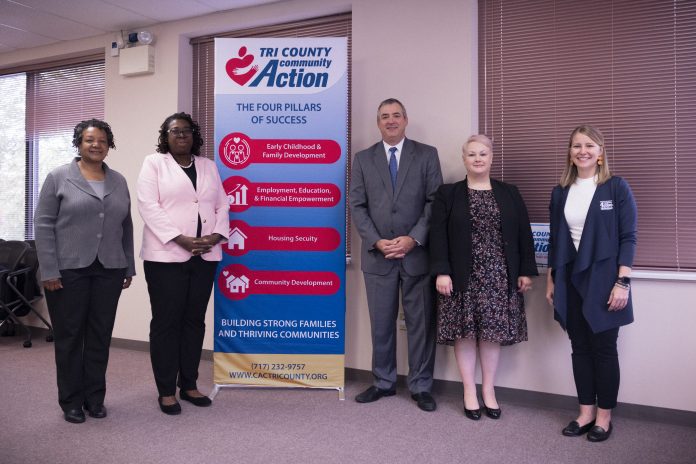ENOLA, PA – Department of Human Services (DHS) Office of Income Maintenance Deputy Secretary Inez Titus and Public Utility Commission (PUC) Chair Gladys Brown Dutrieuille visited Tri-County Community Action in Enola to announce the start of the annual Low-Income Home Energy Assistance Program (LIHEAP) application process for the 2022-23 season.
LIHEAP is a federally funded program administered by DHS that provides assistance for home heating bills so Pennsylvanians with low incomes can stay warm and safe during the winter months. Assistance is available for renters and homeowners. The LIHEAP application period for both cash and crisis grants is open from November 1, 2022, to April 28, 2023.
“LIHEAP helps some of the commonwealth’s most vulnerable people – children, older Pennsylvanians, people with disabilities, and families with low incomes – make ends meet and keep their home safe through the winter,” said Deputy Secretary Titus. “Nobody should ever have to worry that their heat will be shut off during the coldest and darkest months of the year, so I encourage anyone who may need help or anyone who has loved ones or neighbors who could benefit from this program to apply for LIHEAP today.”
“Working together, LIHEAP and various PUC-required utility assistance programs help hundreds of thousands of Pennsylvania households stay connected, safe, and warm,” said PUC Chair Gladys Brown Dutrieuille. “We strongly encourage families to apply for LIHEAP and #CallUtilitiesNow to explore all the available options.”
“Too often, we hear of hardworking people making tradeoffs like not filling a prescription, skipping meals, or refusing to seek health care to pay to keep a roof over their heads. LIHEAP makes it easier for families living on low-income to provide a warm home without making those tradeoffs,” said Jennifer Wintermyer, Chief Executive Officer at Tri-County Community Action.
LIHEAP is distributed directly to a household’s utility company or home heating fuel provider in the form of a grant, so the individual or households do not have to repay assistance. While last season’s LIHEAP benefits were supplemented by additional American Rescue Plan dollars, this season’s benefits will return to more traditional amounts. The minimum LIHEAP cash grant is $300, and the maximum cash grant is $1,000. Those who need the LIHEAP crisis grant – the benefit for people who meet the poverty limits and are in jeopardy of having their heating utility service terminated have already had their heating utility service terminated, or who are out of or have less than two weeks’ worth of deliverable fuel, such as fuel oil, propane, coal, or wood – will be eligible for a maximum of $1,000.
During the 2021-2022 LIHEAP season, 329,230 households statewide received $187,600,202 in LIHEAP Cash benefits, and these households received an average season benefit of $570.
Statewide, 112,029 households received $73,027,268 in LIHEAP Crisis benefits, and these households received an average payment of $596.
The income limit for the program is 150 percent of the Federal Poverty Limit. For an individual, that is a gross income of $20,385 per year, and for a family of four, that is a gross income of $41,625 per year. Pennsylvanians do not need to know their own eligibility in order to apply for these programs. Those who have applied and were denied previously but have experienced a change in circumstances can reapply.
Pennsylvanians can apply for LIHEAP and other public assistance programs online at www.compass.state.pa.us or by phone at 1-866-550-4355. On-site County Assistance Office (CAO) services are available if clients cannot access online services or need assistance that cannot be accessed through the COMPASS website, the myCOMPASS PA mobile app, or by calling the Customer Service Centers at 215-560-7226 for Philadelphia clients or 1-877-395- 8930 for clients in all other counties.
For helpful tips on keeping warm throughout the winter while saving money on utility costs, visit www.energysavers.gov.


